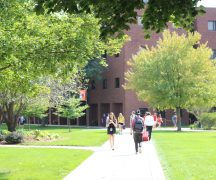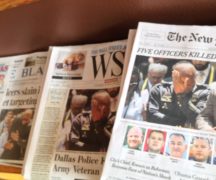By DAVID DUPONT
BG Independent News
Austrian writer Peter Rosei is no stranger to Bowling Green State University. He has visited here four times over the past 20 years.
Ohio can thank Geoff Howes, recently retired professor of German, for planting the idea that led to one of Austria’s leading writers and intellectuals boasting of his ties to Ohio.
The two met in California, and the usual small talk about family and jobs led to an invitation to visit BGSU. Rosei already knew the state from a previous residency at Oberlin College. “I’m kind of a Buckeye boy,” he said.
Rosei is currently a visiting professor at BGSU. He and Howes teach a weekly seminar on his novel “Wien Metropolis,” translated by Howes as “Metropolis Vienna.”
On Wednesday at 7 p.m. at Grounds for Thought, they will give a joint reading of selections from the book. Rosei will read in German, and Howes will read the same selection in English.
The novel is a sprawling tale featuring a host of characters. “It’s about the social and political background of the post war period,” Rosei said. The novel takes the reader from the days just after World War II ended to the current day.
And the discussions in class, conducted both in German and English, touch on parallels between what has occurred in Europe and what is happening in the United States.
The political shift to the right, Rosei said, is occurring in Austria as well. He finds the prospect of those on the extreme right winning “absolutely terrifying.”
He attributes this rightward swing to the lingering effects, financial and emotional, of the financial crash. He likened it to “an earthquake.”
“This left society with a deep anguish, and this anguish is fertile ground for right wing politics,” he said.
Rosei understands the appeal of someone on the other side of the political spectrum like Bernie Sanders who advocates for free public higher education. Coming from Austria where even a nominal fee for education had to be rescinded because of protests, the idea of American students paying $16,000 a year to attend a university is unfathomable. “A prospering society needs everyone’s abilities,” he said.
Austria, he explained, has no natural resources. Its people are its only resource. Making sure they are educated is essential for the country to thrive.
Europe is facing a flood of immigrants, Rosei said. In Austria and Germany, the response is colored by guilt over the Holocaust. The attitude is different in the former Soviet Bloc countries. The belief persists in Hungary and Poland and elsewhere in Eastern Europe that they had no role in the Holocaust and were victims. It was an attitude fostered under the Communists.
Europe is “too weak” to deal with the immigrants, and Rosei is gratified when presidential candidates Hillary Clinton and Sanders acknowledge the United States’ role in the crisis. The invasion of Iraq destabilized the region.
For Europe, “terrorism is much more civil war than war,” he said.
The people, immigrants from former colonies, live in the slums on the fringes of great cities like Paris.
Back in those former colonies people are chaffing under repressive regimes. That gave rise to the Arab Spring. While the media touted those uprisings as liberation, it was only a first needed step, Rosei said. “You have to pay a lot for that step. … It is a bloody road, covered with bodies.”
Europeans also take a jaundiced view toward the United States’ hard stand against the Russian regime of Vladimir Putin. Europeans must still live with Russia as a neighbor. “Whenever they haven’t had a good relationship with Russia it ended up bloody,” Rosei said. So like it or not they must deal with Putin.
Sanctions against the regime don’t help. When people go to the market and everything is three times more expensive, he said, “it’s very easy to make anti-West propaganda.”
And the European Union and NATO’s spread eastward, including the placing of missiles in Poland, he said, has even his liberal Russian friends concerned.
Europeans are also disturbed by the activities of the U.S. National Security Agency. It’s ironic that such surveillance comes from a country that boasts of being “the land of the free.”
“In Europe there’s a strong movement against this,” Rosei said, “that you cannot telephone without someone listening in.”





